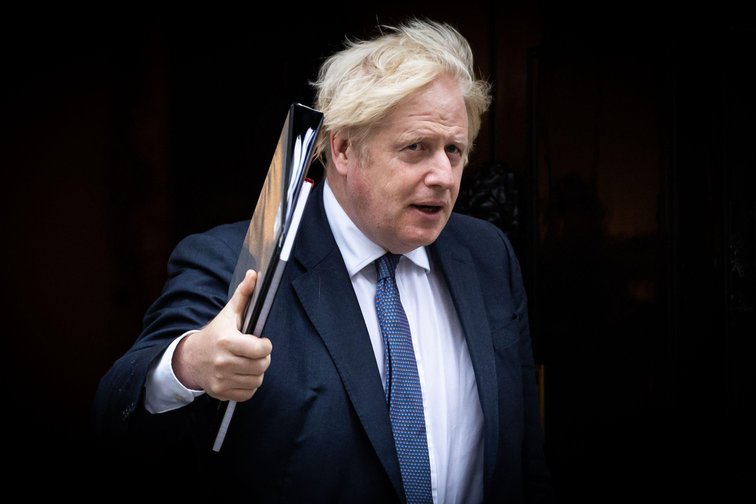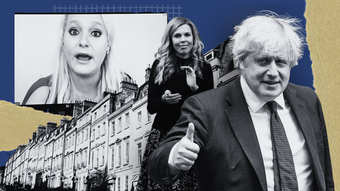Elite Private Members’ Clubs Are at the Heart of Boris Johnson’s Government
Sat 12:41 pm +01:00, 15 Jan 2022 2Human Wrongs Watch

In Boris Johnson’s government, private clubs play an increasingly important role in political life | SOPA Images Limited/Alamy Live News
15 January 2022 (openDemocracy)* — Downing Street may be out of bounds for Boris Johnson to throw any new parties, but he still has other partying options. He was recently pictured at one of London’s most exclusive private members’ clubs, Oswald’s – which is owned by a Conservative Party donor.
Oswald’s is known as a hangout for the rich and famous, hosting celebrities from David Beckham to Amber Heard. But it is also a magnet for senior Tory politicians, including Priti Patel, Michael Gove and George Osborne.
It is easy to overlook the significance of these private clubs. In fact, during last week’s visit, tabloid newspapers seemed more interested in what Carrie Johnson was wearing. But these elite havens have often played a hidden role at the heart of British politics.
They combine so much of what Boris Johnson holds dearest: secrecy, luxury and networking with a small circle of old chums – while keeping outsiders firmly at bay. And as long as the Conservative Party has existed, London’s elite clubs have been a key part of its world.
Just this month we learned how the foreign secretary, Liz Truss, insisted that a taxpayer-funded lunch should take place at what one civil servant described as an “incredibly expensive” club owned by a Conservative donor. The same man also owns Oswald’s in Mayfair.
Last year’s scandal over former minister Owen Paterson – and the government’s attempt to tear up the rulebook on MPs’ standards – also had its roots in a private club. Reports say a mutual friend had a quiet word with Johnson over dinner at the Garrick Club.
Indeed, the Conservative Party itself literally grew out of clubs. Before there was an official party organisation, there was the Carlton Club, which provided office space, sourced candidates and provided a discreet network for private fundraising. Nearly two centuries later, the Carlton still exists – and its ‘Political Committee’ is still one of the largest donors to the Tories.
In the shadows
For politicians, the greatest appeal of clubs is discretion. Sometimes this could be perfectly legitimate, dealing with confidential issues without interruption. But that secrecy also has other uses. The Carlton hosts its own secretive in-house fundraiser dinners, alongside other fundraising groups. The shadowy United and Cecil Club – which uses a legal loopholeto allow donors to remain anonymous – has often fundraised at the Carlton.
Two centuries ago, about one in ten MPs, such as Benjamin Disraeli, used to lie about their clubs – claiming to belong to clubs where they weren’t members to sound more important.
Today, the opposite is true. Plenty of MPs still belong to an exclusive club – sometimes several – but they keep quiet about it, often omitting it from guides like ‘Who’s Who’.
Related story
David Cameron seemed particularly embarrassed by his clubs. He made a point of publicly turning down honorary life membership at the Carlton, which is normally given to all Tory leaders, apparently in protest at their ban on women members, which was still in place at the time.
But what he didn’t mention was that he was already a member of White’s, the oldest club in London – which is men-only. His father had even been chairman. Eventually, after embarrassing newspaper coverage, Cameron resigned from White’s in 2008. But since stepping down as prime minister in 2016, he has discreetly re-joined..
Resurgence of clubs?
Four years ago, I wrote that clubs in politics had become “a venue for hire, nothing more, nothing less”. But now, clubs are playing an increasingly important role in political life.
The Cambridge Analytica scandal showed how the company would tap into the worldwide network in which private clubs operate, offering complete privacy in reciprocal clubs around the world.
The practice is common, from arms dealers and mercenaries to insurance salesmen. Cambridge Analytica’s CEO, Alexander Nix, even planned to host a business dinner at the Carlton for Steve Bannon.
Then, when Boris Johnson was elected as Conservative Party leader, the contest resembled a battle of clubs. Candidates were Michael Gove (Garrick Club); Sajid Javid (Carlton); Boris Johnson (Beefsteak Club, Carlton, 5 Hertford Street); and the ultra-establishment Rory Stewart (Athenaeum, Beefsteak, Special Forces Club, Travellers Club); as well as Jeremy Hunt, who doesn’t declare membership any club memberships.
The trendy new clubs favoured by Johnson, Truss, and their Tory colleagues are a modern breed of the Victorian clubs, which were often owned by their members and worked like co-operatives.
Instead of profit-sharing among the members, the incentive is to squeeze the members and their guests with often-inflated prices. There are dozens in London – Home House, Soho House, 12 Hay Hill, 67 Pall Mall, Fitzdares, to name but a few – with new ones opening all the time.
The Owen Paterson scandal reportedly started when a mutual friend had a word with Johnson at a private club
Robin Birley, who owns clubs including 5 Hertford Street and Oswald’s, is a good example of the small, almost incestuous world of these landlords. Himself the son of a club impresario, Birley is the half-brother of Johnson’s close friend, Zac Goldsmith.
He is also a trustee of the Aspinall Foundation, which employs Carrie Johnson as a press officer. And over the years he has donated to both Johnson’s Tory leadership campaign and to UKIP. Meanwhile, another private members’ club, Annabel’s, is named after Birley’s mother.
Being newer, these modern clubs are also more anonymous. Unlike the older clubs, there are no guidebooks listing their addresses, no published maps, and no brass plaques with the name outside.
At their best, clubs allow like-minded people to get together, as they would in a pub. But at their worst, they can be insular magnets for fantasists, plutocrats, oddballs, and corrupt business people.
Since the deeply ‘clubbable’ Conservative governments of the early 1960s were brought down after sleaze scandals, governments of all parties have been reluctant to be tied too closely to these establishments. As with so much of Johnson’s government, ministers’ reliance on clubs feels like a throwback to an earlier kind of Toryism.
But in the 19th century, when clubs were at their most powerful, the phrase ‘club government’ emerged as a term of abuse, to describe secretive and manipulative deals done in back rooms. Johnson may be about to discover why.
Seth Thévoz is librarian of the National Liberal Club, and author of Club Government. His new book on clubs, Behind Closed Doors, is published by Robinson in July.
 Seth Thévoz
Seth Thévoz
Seth Thévoz is a political, cultural and social historian, whose specialisms include the history of British political finance.
He has been shortlisted for the Whitfield Prize for the best book on British or Irish history by a first-time author, and (alongside his openDemocracy colleagues) for a British Journalism Award for Best Investigation. His website is www.sethalexanderthevoz.com
*SOURCE: openDemocracy. Go to ORIGINAL.
2022 Human Wrongs Watch
Elite Private Members’ Clubs Are at the Heart of Boris Johnson’s Government












BoZo really is Dead Man Walking. The sooner he/it departs political life the better. The sooner he/it departs life itself then better still.
I would like to see him and his ilk fry in Old Sparky. Johnson/Osman of course was born in NYC and has dual nationality.
–
The person who ended Johnson’s(sic) life will never be known for sure. Three members of the Department of Corrections staff simultaneously pressed different buttons, only one of which activated the electric chair.
Ingram shot back into the chair with a tremendous jolt. His fists, which were already clenched, clenched even tighter. He remained motionless there with fists clenched until the current was turned off. There were no other sounds, no smoke, no sizzling. It was completely silent.
He suffered 4 seconds of a 2,000 volt surge, 7 seconds of a 1,000 volt surge and the remainder of 2 minutes at 208 volts.
The body was left for 5 minutes to cool and then was examined by prison medical officers who confirmed death and then the curtains of the window through which the witnesses viewed the event were closed.
http://www.capitalpunishmentuk.org/ingram.html
And NEVER forget or lose sight of the fact that Johnson and his chums have committed far greater heinous acts than Nicholas Lee Ingram did – if that was ever possible.